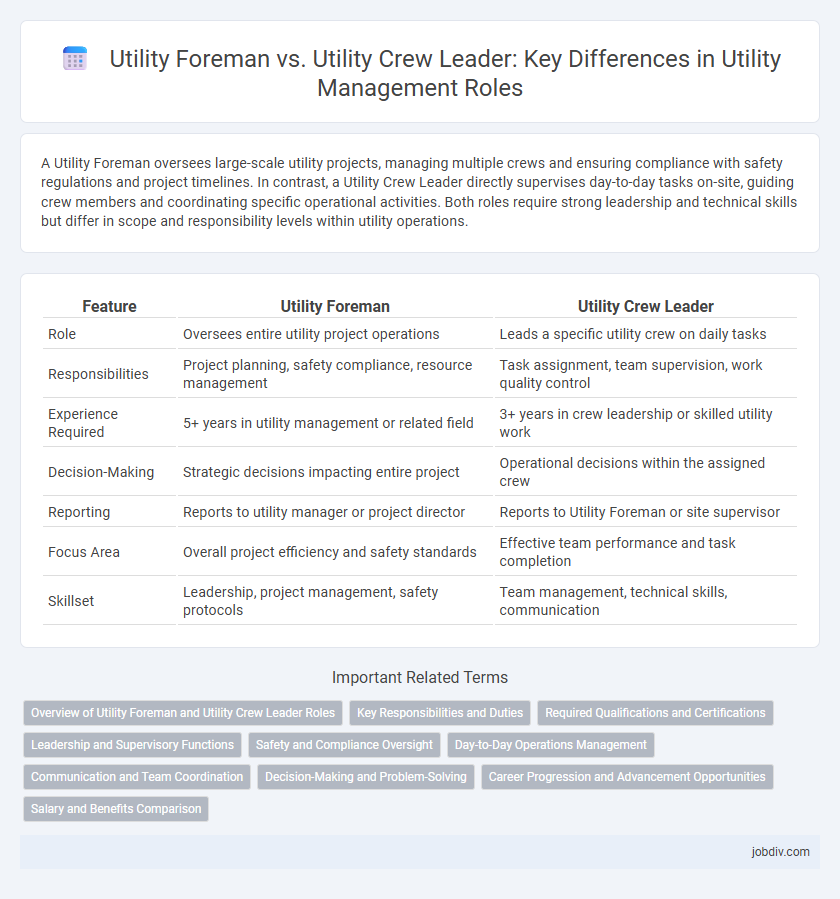A Utility Foreman oversees large-scale utility projects, managing multiple crews and ensuring compliance with safety regulations and project timelines. In contrast, a Utility Crew Leader directly supervises day-to-day tasks on-site, guiding crew members and coordinating specific operational activities. Both roles require strong leadership and technical skills but differ in scope and responsibility levels within utility operations.
Table of Comparison
| Feature | Utility Foreman | Utility Crew Leader |
|---|---|---|
| Role | Oversees entire utility project operations | Leads a specific utility crew on daily tasks |
| Responsibilities | Project planning, safety compliance, resource management | Task assignment, team supervision, work quality control |
| Experience Required | 5+ years in utility management or related field | 3+ years in crew leadership or skilled utility work |
| Decision-Making | Strategic decisions impacting entire project | Operational decisions within the assigned crew |
| Reporting | Reports to utility manager or project director | Reports to Utility Foreman or site supervisor |
| Focus Area | Overall project efficiency and safety standards | Effective team performance and task completion |
| Skillset | Leadership, project management, safety protocols | Team management, technical skills, communication |
Overview of Utility Foreman and Utility Crew Leader Roles
Utility Foremens oversee daily operations, manage crew assignments, and ensure compliance with safety standards in utility projects. Utility Crew Leaders directly supervise field crews, coordinate work tasks, and report progress to the foreman. Both roles are essential in utility maintenance and infrastructure development, with foremen focusing on planning and crew leaders on hands-on execution.
Key Responsibilities and Duties
Utility Foremen oversee utility operations, manage work schedules, and ensure compliance with safety standards, while coordinating with supervisors for project completion. Utility Crew Leaders direct daily crew activities, delegate tasks, and monitor work quality to maintain operational efficiency. Both roles require strong leadership skills and thorough knowledge of utility systems but differ primarily in scope of management and strategic planning responsibilities.
Required Qualifications and Certifications
Utility Foremen typically require extensive field experience and advanced certifications such as OSHA 30-hour safety training and a valid CDL to manage complex utility projects safely. Utility Crew Leaders generally need basic safety certifications like OSHA 10-hour training, along with hands-on technical skills in equipment operation and crew coordination. Both roles demand strong knowledge of local utility regulations and effective communication abilities, but Foremen bear greater responsibility for compliance and project oversight.
Leadership and Supervisory Functions
Utility Foremen primarily focus on direct leadership by managing daily operational tasks, assigning work, and ensuring team safety on-site. Utility Crew Leaders balance hands-on supervision with coordinating crew activities, fostering communication between field workers and management to optimize efficiency. Both roles require strong leadership skills, but Foremen emphasize overall project oversight while Crew Leaders concentrate on team guidance and task execution.
Safety and Compliance Oversight
Utility Foremen oversee multiple crews to ensure strict adherence to safety protocols and regulatory compliance, conducting regular inspections and risk assessments. Utility Crew Leaders focus on direct supervision of on-site personnel, enforcing safety measures, and ensuring workers follow OSHA standards during daily operations. Both roles prioritize hazard identification and mitigation to minimize accidents, but the Foreman typically manages broader compliance strategies across projects.
Day-to-Day Operations Management
Utility Foremen oversee day-to-day operations by coordinating tasks, ensuring safety compliance, and managing workforce schedules to maintain efficient utility service delivery. Utility Crew Leaders focus on executing specific field operations, directing crew activities, and monitoring work quality to achieve project objectives on time. Both roles require strong leadership skills, but Foremen emphasize broader operational management while Crew Leaders concentrate on hands-on crew supervision.
Communication and Team Coordination
Utility Foremen excel in communication by serving as the primary liaison between management and field crews, ensuring clear directives and timely updates. Utility Crew Leaders focus on hands-on team coordination, directly overseeing daily tasks and resolving on-site challenges to maintain workflow efficiency. Both roles require strong communication skills, but the Foreman emphasizes strategic information flow, while the Crew Leader prioritizes immediate operational coordination.
Decision-Making and Problem-Solving
Utility Foremen typically make strategic decisions overseeing project timelines, resource allocation, and safety compliance, ensuring efficient workflow and regulatory adherence. Utility Crew Leaders focus on tactical problem-solving, addressing on-site operational challenges such as equipment malfunctions or crew coordination to maintain productivity. Both roles require strong situational awareness, but Foremen emphasize broader planning while Crew Leaders prioritize immediate issue resolution.
Career Progression and Advancement Opportunities
Utility Foremen typically hold more supervisory responsibilities overseeing multiple utility crews, which positions them for higher managerial roles within utility companies. Utility Crew Leaders focus on direct crew coordination and task execution, providing a foundation for advancing into foreman roles through demonstrated leadership and technical skills. Career progression from Crew Leader to Foreman often involves gaining certifications in utility safety and operations management, enhancing opportunities for advancement into senior utility management or project superintendent positions.
Salary and Benefits Comparison
Utility Foremen typically earn higher salaries than Utility Crew Leaders due to greater responsibilities in project oversight and safety compliance, with median annual pay ranging from $65,000 to $85,000. Utility Crew Leaders earn average salaries between $50,000 and $70,000, reflecting their focus on team coordination and hands-on labor. Both roles often receive benefits including health insurance, retirement plans, and paid time off, but Utility Foremen may have enhanced compensation packages with bonuses and hazard pay.
Utility Foreman vs Utility Crew Leader Infographic

 jobdiv.com
jobdiv.com